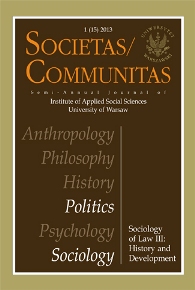The Law, Ideology, and Politics
The Law, Ideology, and Politics
Author(s): Małgorzata FuszaraSubject(s): Social Sciences
Published by: Instytut Stosowanych Nauk Społecznych Uniwersytetu Warszawskiego
Keywords: law; death penalty; crime rate; sense of safety; totalitarian government; democratization; ideology
Summary/Abstract: The author analyzes complex relations between law (mainly criminal law), ideology and politics in Poland. Poland offers interesting insight into situations in which multiple transformations of law take place - first when Poland regained independence in 1918 after partition between 3 neighboring states, secondly - after World War II when communist system was introduced from outside, and finally - after deep political and economic regime transformation in 1989. Thus Poland provides a good testing ground for Adam Podgórecki's hypothesis of the three-tier operation of law. Podgórecki posited that the operation of law depends on three factors: the social, political and economic system; group subculture; and personality type. In the paper special attention is devoted to the transformation from a totalitarian system into a democracy after 1989 as accompanied by shift in philosophy of punishment, changes of crime rates and level of sense of safety and social attitudes towards punishments. Attitudes towards capital punishment in Poland served as special example of complex relation between politics, ideology and law.
Journal: Societas/Communitas
- Issue Year: 2013
- Issue No: 15 (1)
- Page Range: 161-182
- Page Count: 21
- Language: English

